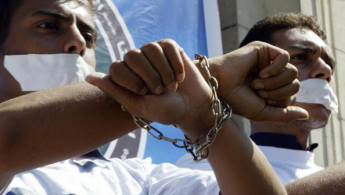Self-exiled Egyptians denied right to official documents: HRW
The Egyptian authorities in recent years have systematically refused to provide or renew the identity documents of dozens of dissidents, journalists and human rights activists living abroad, Human Rights Watch (HRW) said in a report released on Monday.
"The inability to obtain birth certificates or renew essential documents such as passports and ID cards have hampered access to basic rights for dissidents abroad and their dependent family members," the international watchdog added.
HRW interviewed 26 Egyptian dissidents, journalists, and lawyers living in different countries from June to December 2022, and reviewed dozens of documents such as written correspondences, passports, and official forms.
Some had a form of temporary or permanent residence permit, others filed for asylum, and most of them live with their spouses and children abroad, while family members of 10 of the interviewees were denied documents.
"The Egyptian government's export of repression via its embassies and consulates abroad seeks to destroy the livelihoods of Egyptians living in exile and has become an important aspect of its unrelenting assault on all forms of dissent," said Adam Coogle, deputy Middle East and North Africa director at Human Rights Watch.
HRW learned from them that it was nearly impossible to legally challenge Egyptian authorities' rejection to provide official documents, especially when embassies and consulates refuse to process power of attorney requests to authorise lawyers in Egypt to act on behalf of those abroad.
Based on official figures and estimates published in recent years, from nine to 14 million Egyptians live abroad; tens of thousands of them have been living in self-exile to avoid repression at home, especially members or supporters of the Muslim Brotherhood group.
Since taking power in 2014, Sisi has frequently been accused by local and international rights groups of overseeing the worst crackdown on human rights, freedom of expression, and media in Egyptian history," causing one of the largest politically driven outward migration waves in decades.
Last week, an Egyptian state security court sentenced 17 defendants from five to life in prison. The defendants were found guilty of belonging to the Muslim Brotherhood, legally designated a terrorist group in Egypt since 2014, among other charges.
The once-influential Islamist movement won Egypt's first free presidential election in 2012.
But the then-defence minister Abdel-Fattah El-Sisi overthrew late president Mohamed Morsi in a military coup a year later.




 Follow the Middle East's top stories in English at The New Arab on Google News
Follow the Middle East's top stories in English at The New Arab on Google News
![A group of Palestinians, foreign and Israeli activists gather to participated in an olive picking event on the land in the town of Battir, which is under threat of confiscation by Israel in Bethlehem, occupied West Bank on 8 November 2024. [Getty]](/sites/default/files/styles/image_330x185/public/2182930803.jpeg?h=199d8c1f&itok=__0LgGsa)

![People gathered around the rubble of destroyed houses to search for survivors [Getty]](/sites/default/files/styles/image_330x185/public/2024-11/GettyImages-2184733820.jpg?h=199d8c1f&itok=NiM1LO2f)